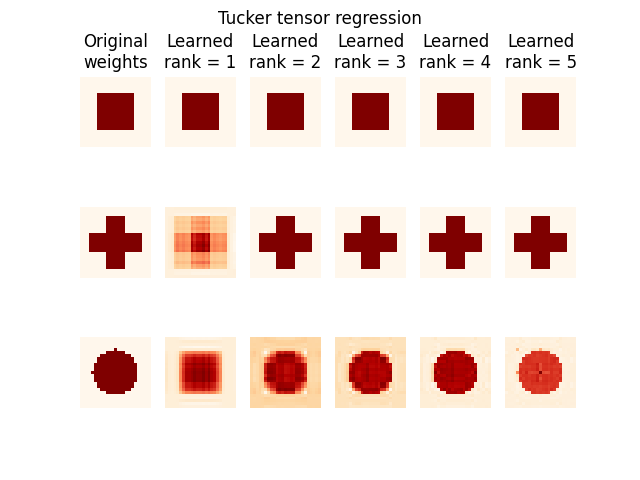Note
Go to the end to download the full example code.
Tucker tensor regression
Example on how to use tensorly.regression.tucker_regression.TuckerRegressor to perform tensor regression.

fitting pattern n.0
fitting for rank = 1
fitting for rank = 2
fitting for rank = 3
fitting for rank = 4
fitting for rank = 5
fitting pattern n.1
fitting for rank = 1
fitting for rank = 2
fitting for rank = 3
fitting for rank = 4
fitting for rank = 5
fitting pattern n.2
fitting for rank = 1
fitting for rank = 2
fitting for rank = 3
fitting for rank = 4
fitting for rank = 5
import matplotlib.pyplot as plt
from tensorly.base import tensor_to_vec, partial_tensor_to_vec
from tensorly.datasets.synthetic import gen_image
from tensorly.regression.tucker_regression import TuckerRegressor
import tensorly as tl
# Parameter of the experiment
image_height = 25
image_width = 25
# shape of the images
patterns = ["rectangle", "swiss", "circle"]
# ranks to test
ranks = [1, 2, 3, 4, 5]
# Generate random samples
rng = tl.check_random_state(1)
X = tl.tensor(rng.normal(size=(1000, image_height, image_width), loc=0, scale=1))
# Parameters of the plot, deduced from the data
n_rows = len(patterns)
n_columns = len(ranks) + 1
# Plot the three images
fig = plt.figure()
for i, pattern in enumerate(patterns):
print(f"fitting pattern n.{i}")
# Generate the original image
weight_img = gen_image(
region=pattern, image_height=image_height, image_width=image_width
)
weight_img = tl.tensor(weight_img)
# Generate the labels
y = tl.dot(partial_tensor_to_vec(X, skip_begin=1), tensor_to_vec(weight_img))
# Plot the original weights
ax = fig.add_subplot(n_rows, n_columns, i * n_columns + 1)
ax.imshow(tl.to_numpy(weight_img), cmap=plt.cm.OrRd, interpolation="nearest")
ax.set_axis_off()
if i == 0:
ax.set_title("Original\nweights")
for j, rank in enumerate(ranks):
print(f"fitting for rank = {rank}")
# Create a tensor Regressor estimator
estimator = TuckerRegressor(
weight_ranks=[rank, rank], tol=10e-7, n_iter_max=100, reg_W=1, verbose=0
)
# Fit the estimator to the data
estimator.fit(X, y)
ax = fig.add_subplot(n_rows, n_columns, i * n_columns + j + 2)
ax.imshow(
tl.to_numpy(estimator.weight_tensor_),
cmap=plt.cm.OrRd,
interpolation="nearest",
)
ax.set_axis_off()
if i == 0:
ax.set_title(f"Learned\nrank = {rank}")
plt.suptitle("Tucker tensor regression")
plt.show()
Total running time of the script: (0 minutes 1.139 seconds)